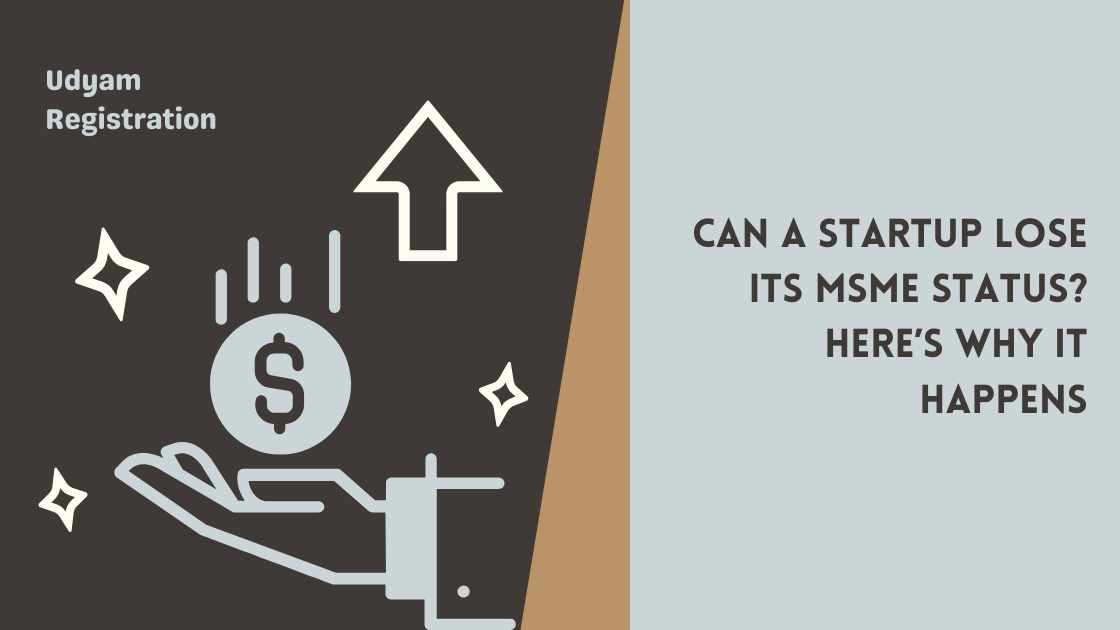When a startup gets MSME (Micro, Small, and Medium Enterprise) status through Udyam Registration, it opens the door to many benefits like government schemes, subsidies, loans, and ease of doing business. But many startup founders don’t realize that this MSME status is not permanent. Yes — a startup can lose its MSME status if it fails to follow certain rules or crosses specific limits.
In this blog, we will explain in easy-to-understand terms why a startup might lose its MSME recognition, how to avoid it, and what steps to take if it happens.
✅ What Is MSME Status and Why Is It Important for Startups?
MSME status is given to businesses that register under the Udyam Registration portal in India. It helps startups:
-
Get collateral-free bank loans
-
Enjoy lower interest rates on credit
-
Avail subsidies under government schemes
-
Participate in tenders reserved for MSMEs
-
Receive tax and regulatory support
Startups that are new and growing can register easily online at trusted platforms like udyamregisteration.org to get their Udyam certificate.
⚠️ Can a Startup Really Lose MSME Status?
Yes, absolutely. MSME status is based on two main conditions:
-
Investment in plant & machinery or equipment
-
Annual turnover (sales)
If your startup crosses the limits defined for micro, small, or medium enterprise — you are no longer eligible to hold that status.
Additionally, failing to update details, submitting wrong information, or not following compliance rules can also lead to cancellation.
🧾 What Are the Current Limits for MSME Classification?
According to the MSME definition (as per Udyam Registration), here are the limits:
| MSME Type | Investment in Plant & Machinery/Equipment | Annual Turnover |
|---|---|---|
| Micro | Up to ₹1 crore | Up to ₹5 crore |
| Small | Up to ₹10 crore | Up to ₹50 crore |
| Medium | Up to ₹50 crore | Up to ₹250 crore |
If your startup goes beyond these thresholds, your MSME classification will automatically change or may even be revoked.
🚨 Common Reasons Why Startups Lose MSME Status
Let’s look at the top reasons why startups lose their MSME recognition:
1. Crossing Investment or Turnover Limit
As your business grows, you may invest more in equipment or generate more sales. If you exceed the defined limits, your MSME classification gets updated or cancelled.
2. Failure to Update Udyam Registration
Many startups forget to update their Udyam Registration every year with correct turnover and investment details. The government verifies this data with PAN and GST systems. If you fail to update, your certificate may be invalidated.
3. Wrong or False Information During Registration
If you entered incorrect Aadhaar, PAN, GSTIN, or financial data while applying, and it doesn’t match official records, your registration can be rejected or withdrawn.
4. Merger or Change in Company Structure
If your startup merges with another company or changes ownership or legal structure (like converting to a large enterprise), it may lose eligibility for MSME status.
5. Non-Compliance with Government Rules
Startups that do not follow business regulations, tax rules, or misrepresent their MSME status in tenders or funding applications may be penalized and lose recognition.
🔄 What Happens If You Lose MSME Status?
Here’s what startups should expect if they lose their MSME recognition:
-
You won’t get MSME benefits like subsidies, lower-interest loans, or scheme eligibility.
-
Tenders for MSMEs may become inaccessible to your business.
-
Bank loan benefits and priority sector lending may no longer apply.
-
You may be required to register under another business category.
🛡️ How to Prevent Losing Your MSME Status
Now that you know the risks, here are simple tips to retain your MSME certificate:
✅ 1. Monitor Your Turnover and Investment
Keep track of your financials monthly. If you are nearing the MSME limits, plan your expansion in a way that doesn’t disqualify you too soon (if possible).
✅ 2. Update Your Udyam Registration
Use your PAN and GST-linked data to update your Udyam certificate on the portal annually. This is now mandatory and auto-verification will happen with government databases.
✅ 3. Maintain Transparency
Don’t provide wrong or estimated data while registering. Be honest with the figures to avoid cancellation later.
✅ 4. Use Trusted Platforms for Registration
Websites like udyamregisteration.org can help you register, update, or re-register with proper guidance to avoid errors.
✅ 5. Stay Compliant
File GST and Income Tax returns on time, maintain your company’s financial records, and follow business laws strictly.
🔁 Can You Re-Apply for MSME Status After Losing It?
Yes, but with conditions.
If your MSME status was lost due to incorrect details or failure to update data, you can correct it and re-apply. However, if you have genuinely crossed the threshold (investment/turnover), you may no longer be eligible.
In such cases, consult with a legal or MSME expert to find out if any new classification applies.
🧩 Case Example: A Startup That Lost MSME Status
RajTech Solutions, a Bangalore-based software startup, registered under Udyam as a micro-enterprise in 2022. By 2024, the business had grown rapidly and crossed ₹60 crore in turnover. Since they didn’t update their Udyam registration, their MSME certificate became invalid.
The startup lost access to important tenders and couldn’t apply for the Mudra loan scheme. Later, they approached udyamregisteration.org, corrected their records, and reclassified under the medium enterprise category.
This shows the importance of tracking your growth and keeping your Udyam details up to date.
📌 Final Thoughts: Stay Informed, Stay Registered
MSME status offers great advantages, especially for early-stage startups. But it is also your responsibility to keep the status valid. As your business grows, you may naturally outgrow the MSME limits — and that’s okay. But make sure you handle the transition properly.
By:
-
Monitoring your turnover and investment
-
Updating your Udyam certificate regularly
-
Using reliable platforms like udyamregisteration.org
-
Avoiding false information
You can stay compliant and continue to enjoy government support for as long as you qualify.
